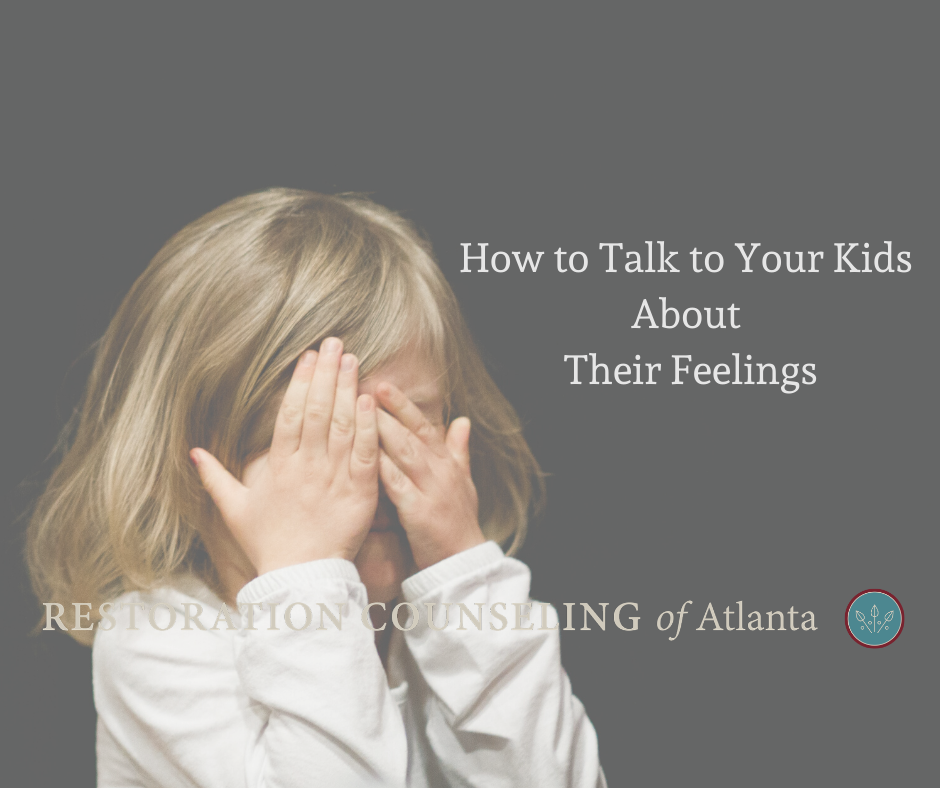It can seem overwhelming to talk to your kids about their feelings, especially if you immediately tense up at the mention of the word emotions. People often think that not talking feelings means that they go away, but this method of handling emotions is not helpful and actually causes anxiety. This quote by Mr. Rogers is a wonderful approach to how to deal with feelings: “Anything that’s human is mentionable, and anything that is mentionable can be more manageable. When we can talk about our feelings, they become less overwhelming, less upsetting, and less scary.”
Why It’s Important to Talk about Feelings
It is very important to teach children to recognize how they are feeling. A child learns from a parent how to handle their emotions. The parent needs to recognize and identify their own triggers when a child gets angry or upset. The more emotionally aware a parent is, the more they will be able to teach their child about their own feelings. Often parents respond in fear because they are uncertain or scared of their child’s emotion, which makes the child more afraid to express themselves. Emotions are not meant to be scary, but they can be for a child who is trying to figure out their emotions. The best gift a parent can give their children is to be emotionally aware and present. How we talk to our children empowers them or discourages them. It is important to teach children that self-awareness can be their superpower to success in life.
Create a Safe Place to Talk about Feelings
Parents need to strive to create an atmosphere where children desire to talk about their feelings so they feel safe to explore them. It is also important for the parent to be comfortable helping the child to explore these feelings.
Here are some phrases that create emotional safety for children:
- It’s okay to feel mad or sad.
- You feel mad at me right now and that is okay.
- How you are feeling is okay. However, you need to choose healthy choices that do not harm someone else.
- You are having a hard time right now and that’s okay.
- You don’t want a hug right now and that’s okay.
- It makes you mad when ____ and that’s okay.
- Let’s explore what you are feeling right now.
- Ask a child questions about how he might be feeling instead of making assumptions. For example, “Could you feel mad because your brother took the ball away? Now that you know you are mad at him for taking the ball away, use your words in a healthy, constructive way to tell him you feel. Tell him that next time you would like for him to ask first before taking the ball.”
Set a Good Example
Be vulnerable with your children about what makes you feel upset. Let them know that they are not alone in what they are feeling. Tell them that emotions don’t have to be scary, but you must be willing to believe that yourself. Children will watch how you handle emotions and arguments and they will learn to either remain calm or be explosive. Explain to them that feelings are an indicator, like when your car engine light comes up to let you know your gas tank is running low. If you do not have that indicator, then you will not know that you are about to run out of gas. The same is true about emotions.
Don’t Be Afraid of Anger
The word anger is very close to the word danger so use that emotion as a warning sign. Use the word anger to stop and think about what might have made you upset before reacting to your anger. Anger is usually the sign that a boundary has been crossed. Anger can also be a secondary emotion that can protect someone from sadness or fear. Help your children know that expressing anger can be healthy because it can represent sadness or fear.
Connect With Your Child Emotionally
Encourage your children to connect with you emotionally by telling you about the happiest part of their day and about the saddest part. This will help them get in the habit of talking about emotions. It will feel less scary to them. All emotions are on a continuum so someone might feel a small amount of sadness. Help your child identify if they are feeling a heavy sadness or a small feeling of sadness. They can rate their emotions on a scale from 0-10. That might help them to feel less scared of how they are feeling. Empathize with them and tell them that you feel sad with them as well. Don’t be afraid of their sadness. They want empathy instead of you trying to fix it for them, so validate their emotions. Ask yourself if you are responding the way you are because of your own fear. How would you want someone to respond to you?
Increase Your Own Emotional Awareness
Finally, teaching a child about their emotions can help a parent to be less scared of their own emotions. Emotions do not get to rule your life unless you allow them. Greater awareness of your own emotions can create greater awareness of how you teach your children about theirs. We all want to be listened to and cared for and not alone in how we feel. If you don’t know what to say to your children, then just validate their emotions. Be joyful with them when they are happy and feel sad with them when they feel sad. Being present with someone in their emotions is exactly what they need to feel seen and cared for.
mead@restorationcounselingatl.com, ext. 115
Roswell and Woodstock Locations
Mead counsels children, adolescents, adults, and families who are struggling with anxiety, depression, communication difficulties, grief, as well as other life issues. She is a certified PREPARE/ENRICH facilitator and also works with premarital couples. She is trained in sand tray therapy which is beneficial for working with children and individuals. Mead’s sincere desire to help her clients experience freedom from fear. She is passionate about helping her clients to get out of the rut that they have been experiencing and into new, healthy, relationship patterns. She will provide a safe environment for healing.


 by
by